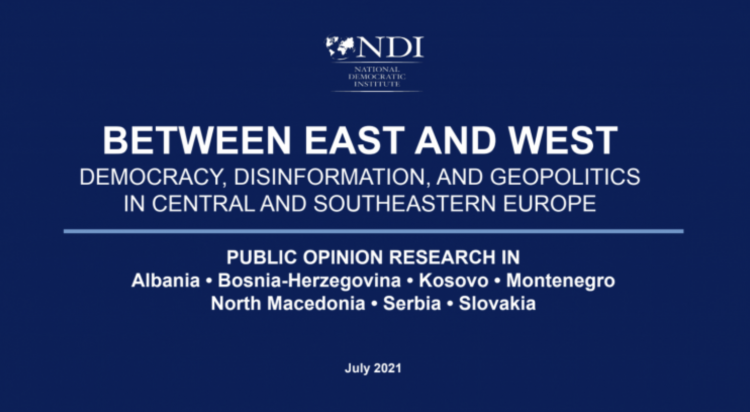Between East and West: Democracy, Disinformation, and Geopolitics in Central and Southeastern Europe
Public opinion research conducted by the National Democratic Institute (NDI) in 2021 across seven countries in Central and Southeastern Europe – Albania, Bosnia and Herzegovina, Kosovo, Montenegro, North Macedonia, Serbia, and Slovakia – highlighted a common trend of democratic stagnation or regression, with citizen priorities focused on improving the quality of life over democratic standards.
While strong majorities across the countries surveyed esteem democracy as the preferred system of government, they are skeptical that it can be achieved in reality. Challenges within the EU, such as Brexit, and disinformation and other foreign illiberal influences have had a deleterious impact on public attitudes regarding democratization processes.
Overall, security and law enforcement are more highly regarded than political institutions, judicial bodies, and government ministries responsible for social services like healthcare and education. The one exception was the support for the President in Slovakia and Serbia. Notably, with the exception of Slovakia, workforce emigration remains a salient political and economic issue.
After the fall of communism, and since the violent conflicts of the 1990s in the Western Balkans, countries in this region have largely focused on integration into the European Union (EU) and other Euroatlantic structures. However, in recent years, Russia, China, and other foreign powers have increased their presence in the region, gaining public support, most visibly in Montenegro, North Macedonia, and Serbia, Russia. However, with the exception of Serbia, citizens would still prefer to follow the path toward Euroatlantic integration, even if it meant spoiling relations with China and/or Russia. Likewise, although support for the EU or the United States (U.S.) has waned, citizens still see the U.S. and/or EU as offering the most support to their respective countries, including financial assistance, with Serbia again being the exception.
With regard to disinformation, respondents saw mainstream media outlets as key information drivers. And although the public trusts information on social media, with predominant use of Facebook, Instagram, and YouTube as preferred platforms, people generally prefer to discuss politics and news in-person.
NDI utilized telephone and online interviews – CAPI (Computer Assisted Personal Interviewing) and CAWI (Computer Assisted Web Interviewing) – to conduct the research in a safe manner during the COVID-19 pandemic. The margin of error is +/- 2% or under in all polled countries.
NDI is a non-profit, non-partisan, non-governmental organization that works in partnership around the world to strengthen and safeguard democratic institutions, processes, norms and values to secure a better quality of life for all. NDI envisions a world where democracy and freedom prevail, with dignity for all.
